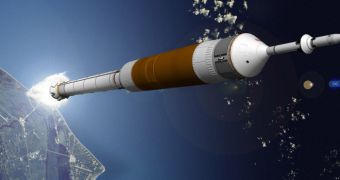According to a report released on Monday by the Congressional Budget Office (CBO), squeezing a new space mission among the ones to be conducted before the scheduled retirement of the shuttles could prevent this retirement process from happening in due time – by 2010, as hoped. The chance for this to still take place as scheduled was evaluated to be as low as 5% (more accurately, between 5 and 30%). The Office assessed the factors linked to the event, as well as its impact on the replacement initiative.
The new mission planned referred to carrying the Alpha Magnetic Spectrometer to the International Space Station. It would be the 11th mission that would have to be completed during the 2 years remaining until the announced date for the retirement of the old space shuttle system, which would allow for the budget allocated for space programs to be redirected towards the development, completion and implementation of the new system. NASA previously planned to cancel all the missions that were not carried out by September 2010.
The replacing spacecraft consists of the Orion Crew Exploration Vehicle and the Ares I rocket that will carry it, and is supposed to be ready for launch by 2015, although the agency is investing a lot of effort in having it ready by up to 6 months earlier. The experts also weighed options in completing it even sooner, by September 2013, if $1 billion was made available for the operations, but they recently dismissed the ambitious plan as highly improbable.
Not only that they may not be able to finish the work on the new space vehicle sooner, but they might even experience delays, given the problems emerging on the horizon. The issues include the Orion's capsule mass, which has to be kept to a minimum, as well as its heat shield, but also the Ares rocket's possible oscillation during ignition and some troubles with its J-2X upper-stage engine.

 14 DAY TRIAL //
14 DAY TRIAL //